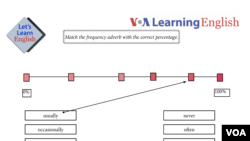Let's Learn English (ມາຮຽນອັງກິດນຳກັນ) ເປັນບົດຮຽນແນວໃໝ່ສຳລັບຜູ້ຢາກຮຽນພາສາອັງກິດ. ພວກນາຍຄູສອນພາສາອັງກິດ ແບບອາເມຣິກັນ ໄດ້ອອກແບບບົດຮຽນນີ້ ສຳລັບພວກທີ່ເລີ້ມຕົ້ນໃໝ່. ບົດຮຽນຈະດຳເນີນໄປເລື້ອຍໆເປັນເວລາ 52 ອາທິດ.
ໃນແຕ່ລະອາທິດ ຈະມີບົດຮຽນໃໝ່ ພ້ອມດ້ວຍວີດີໂອ ສະແດງໃຫ້ເຫັນຊີວິດຂອງພວກຊາວໜຸ່ມອາເມຣິກັນ. ບົດຮຽນດັ່ງກ່າວ ແມ່ນຮວມທັງຄຳແນະນຳ ໃນການເວົ້າ, ຄຳສັບ ແລະການຂຽນ.
ນອກນັ້ນ ຍັງມີບົດຝຶກຫັດທີ່ພິມໄດ້, ການຊັ່ງຊາ ແລະການວາງແຜນຮຽນສຳລັບສ່ວນບຸກຄົນແລະນາຍຄູສອນອັງກິດ. ພວກເຮົາຢາກຊຸກຍູ້ໃຫ້ທ່ານຕິດຕາມບົດຮຽນປະຈຳ ອາທິດ ແລະໂອ້ລົມກ່ຽວກັບຄວາມກ້າວໜ້າຂອງທ່ານກັບພວກເຮົາ ໂດຍຜ່ານທາງບົດ ຄວາມເຫັນແລະໂດຍທາງອີແມລ.
ໃຈຄວາມ (Summary)
It's a Sunday afternoon in Washington, D.C. Anna is bored. She finds something interesting to do when she hears music playing.
ມັນເປັນຕອນບ່າຍວັນອາທິດ ຢູ່ວໍຊິງຕັນ, ດີຊີ. Anna ຮູ້ສຶກເບື່ອ. ລາວພົບສິ່ງໃດສິ່ງນຶ່ງທີ່ໜ້າສົນໃຈຈະເຮັດ ເວລາລາວໄດ້ຍິນສຽງດົນຕີດັງຂຶ້ນ.
ເວົ້າ (Speaking)
In this video, learn to say the new words. Learn to talk about cause and effect. You can also download the Activity Sheet and practice talking about your usual - and unusual - activities.
ອອກສຽງ (Pronunciation)
In this video, you learn about what happens when two words with same sound come together.
ສົນທະນາ (Conversation)
ຂຽນ (Writing)
What do you usually do on a Sunday afternoon? (Or on your day off.) Send us an email or write about how frequently you do different activities in the Comments section. Click on the image below to download the Activity Sheet and practice with a friend.
ຍຸດທະສາດການຮຽນ (Learning Strategy)
Learning Strategies are the thoughts and actions that help make learning easier or more effective.
The learning strategy for this lesson is Make an Inference. Learning English is easier when you can make an inference about meaning. Here is an example.
Rory is traveling. At the airport, he is looking for his airline when he walks into a woman by mistake. She yells at him, "Hey, don't be so inconsiderate! Watch where you're going!" Rory does not know the word "inconsiderate." But the woman's angry face and loud voice help him to understand that she is angry. He makes the inference that "inconsiderate" means "rude," or "impolite," and he quickly apologizes. "Oh, I'm very sorry! I am looking for the airline desk." The woman says, "Okay, but be more careful."
How do you make inferences in studying English? Write to us in the Comments section or send us an email. Teachers, see the Lesson Plan for more details on teaching this strategy.
ສອບຟັງ (Listening Quiz)
Desktop Computer: Click here to go directly to the Listening Quiz. Click on the button below if you are on a mobile device or our mobile site.
______________________________________________________________
ຄຳສັບໃໝ່ (New Words)
______________________________________________________________
ອຸບປະກອນການຮຽນຟຣີ (Free Materials)
Download the VOA Learning English Word Book for a dictionary of the words we use on this website.
Each Let's Learn English lesson has an Activity Sheet for extra practice on your own or in the classroom. In this lesson, you can use it to practice a conversation about activities.
ສຳລັບນາຍຄູ (For Teachers)
See the Lesson Plan for this lesson for ideas and more teaching resources. Send us an email if you have comments on this course or questions.
Grammar focus: Frequency adverbs, cause and effect phrases
Topics: Usual and unusual activities
Learning Strategy: Make an Inference
Speaking & Pronunciation Focus: Using frequency adverbs to talk about cause and effect; blended sounds
______________________________________________________________
Now it's your turn. Send us an email or write to us in the Comments section below or on our Facebook page to let us know what you think of this lesson.











